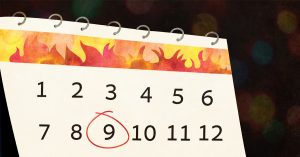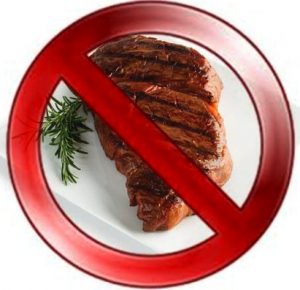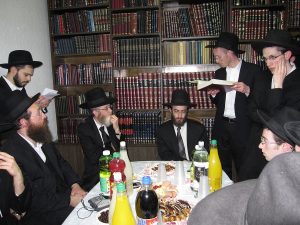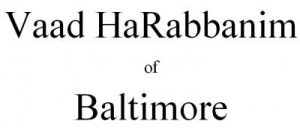 Mazel tov to long time friends (decades mamish) Naomi and Howie Berg upon the birth of a grandson born to their children Gabrielle and Noah Lindenfeld. Welcome to the world baby Lindenfeld. Mazel tov as well to Drs. Valerie and Shelly Lindenfeld. May your new grandson bring at least 120 years of joy and nachas to his parents, grandparents and extended families. Omen!
Mazel tov to long time friends (decades mamish) Naomi and Howie Berg upon the birth of a grandson born to their children Gabrielle and Noah Lindenfeld. Welcome to the world baby Lindenfeld. Mazel tov as well to Drs. Valerie and Shelly Lindenfeld. May your new grandson bring at least 120 years of joy and nachas to his parents, grandparents and extended families. Omen!
Raboyseyee and Ladies:
The Virtual Siyum & The Ever Shrinking Observance of the Nine Days
The Oisvorfer has a chaver who hails from Baltimore, Md. He comes from a very fine family. Both his parents are educators, quite pious, and avada well educated. His father, a yeshiva rebbe and much more, has been teaching 5th graders -what in the yeshiva system is known as hascholas gemorah (introduction to the heylige Gemora) for over forty years; his mother, a girls school teacher for thirty. They are, he tells me, the real deal. Long story short, about a year ago, as the Nine Days were approaching, we got into a discussion over these dreaded days and different minhogim (customs) people have to properly recall and mourn the destruction of both Botay Mikdash (first and second Temples). And why is all this information being shared? Halt zich eyn (keep your pants on): grada, the changing of pants during the Nine Days is not without some controversy. In any event, keep on reading, it will all fall into place in the paragraphs to follow. Ober, let’s taka begin here: what are the Nine Days? And just what were we discussing? Nu, if you are frum-from-birth, in some circles referred to as an FFB, you avada know that the nine days leading up to, and including Tisha Be’ov (the ninth day of the Hebrew month of Ov, with Tisha Be’ov coming in as the 2nd most solemn day in our Jewish calendar), are not to be taken lightly. For reasons that remain mysterious, bad stuff happens to our people during the Nine Days. Not to everyone: ober, to enough. Enough to leave one mamish spooked.
 How do we observe these Nine Days? Nu, that depends on who you ask, minhogim (customs) you may have seen while growing up or learning about in yeshiva, or even from others. The Mishneh Birura has 18 subsections (Vol 6: Section 551) dedicated to the week of Tisha Be’ov and the Nine Day restrictions. It’s generally accepted that the verboten list -in our times- includes the following restrictions:
How do we observe these Nine Days? Nu, that depends on who you ask, minhogim (customs) you may have seen while growing up or learning about in yeshiva, or even from others. The Mishneh Birura has 18 subsections (Vol 6: Section 551) dedicated to the week of Tisha Be’ov and the Nine Day restrictions. It’s generally accepted that the verboten list -in our times- includes the following restrictions:
1- the eating of meat and the drinking of wine
2- making weddings
3- listening to live music
4- getting haircuts
5 shaving
6- doing laundry (now expanded to include a restriction against wearing new, or even freshly laundered clothing)
7- going to the movies; Broadway shows included
8- executing contracts and or entering into new business ventures
9- swimming, bathing and even showering: OMG!
 Ober it’s not all bad, and before you consider throwing down your yarmulke and searching out a less restrictive religion, there are generally accepted loopholes to all, or most of these items. In fact some Sephardim even make weddings during the Nine Days. You can rest assured that the bride, groom and the rest of the guests, are eating meat, drinking wine, and listening to live music. We assume they also all shower, wear clean underwear, and shave, where and if necessary, if you chap. These loopholes are however beyond the scope of this review.
Ober it’s not all bad, and before you consider throwing down your yarmulke and searching out a less restrictive religion, there are generally accepted loopholes to all, or most of these items. In fact some Sephardim even make weddings during the Nine Days. You can rest assured that the bride, groom and the rest of the guests, are eating meat, drinking wine, and listening to live music. We assume they also all shower, wear clean underwear, and shave, where and if necessary, if you chap. These loopholes are however beyond the scope of this review.
Ober, where is all this written? In the heylige Toirah? Not! Efsher in the Mishneh or heylige Gemora? Also not! Where then?! No place! Shoin and fartig. Who made these Nine Days so restrictive? Nu, let’s try and find out. Says the Mishneh (Taanis 26b), azoy: Mi’she’nich’nas Av, mi’a’tin b’simcah (when the month of Av arrives, we diminish our happiness). That’s all! How does one diminish happiness? Says the heylige Gemora (Yivomis 43a) as elucidated by the Tur Oirach Chayim, azoy: what the heylige Gemora wants to tell us is that during these Nine Days, we should decrease our business activities, refrain from construction and planting for pleasure, we should not make weddings, and we should not make a festive meal in celebration of an engagement.
Did you see anything on that short list which includes a prohibition against eating meat and drinking wine? How about wearing clean underwear? You did not! Yet, the nine days are -in today’s times- very closely associated with the restrictions on meat and wine, and the rest of the list found above. Ober like many -seemingly most, if not all- restrictions, these too come with loopholes. Boruch Hashem (Blessed be the Lord) that our rabbis saw fit -at times- to find what they call legal loopholes around what we might consider onerous laws on our books. We have previously discussed the selling of one’s chomaitz over Pesach as loophole number one; the Pruzbil and its first cousin, and the Heter Iska, both designed to overcome business issues which arise -of course- when we loan money to friends, and other Jewish people, come in second and third. In short, people like Hillel Hazokane came along and recognized that a strict interpretation of certain laws found in the heylige Toirah, or elsewhere, were too challenging -mistama he chapped that people would violate them regularly- and decided to create these legal loopholes. Shoin: Those following the loopholes now had a legal and kosher way of circumventing the laws as originally given or understood.
So happens that one of the generally accepted customs which seems to have morphed into law, is not to eat meat and or enjoy wine during the Nine Days. Why not? The restriction is seemingly connected to our mourning of the Battei Mikdash (Holy Temples) which were both destroyed several thousand years ago, both on Tisha Be’ov. Grada, we mourn them and pray daily for the rebuilding of the Temple in parts of our davening.
Ober as Tisha Be’ov approaches, we begin more intense mourning and as part of the mourning, we refrain from eating meat and drinking wine. They top the list of nine day restrictions. Why these two items? Seemingly both are associated with joy; both are also associated with the Temple offerings where the Yiddin brought sacrifices and libations. Ober, we ask again, is the restriction against eating meat and imbibing wine during these Nine Days mentioned anywhere? Is it in fact law? Where can we find it? And the answer is azoy: It’s not law! At least it was not law: It is abundantly clear that the only restriction against eating meat and enjoying wine mentioned in the heylige Gemora, is to refrain only on the day before Tishe Be’ov (day eight), and even then, only at the last meal before the beginning of the fast. In the frum world, this last meal is known as the ‘seudas hamefsekes’ the meal which separates eating from fasting. What happened next?
A new minhag was born. Those of Ashkenazic decent began to refrain from eating meat and drinking wine on the first day of Av, on Roish Choidesh mamish -a day typically associated with gladness, joy, and at times, even with a special meal in honor of the day. Why? Ver veyst? What happened next? The minhag somehow morphed into a din (law) which remains on our books. Ober, doesn’t the heylige Toirah warn us against adding or subtracting new laws? We were! Ober did all the Yiddin join their Ashkenazic cousins and refrain from enjoying meat and wine during the Nine Days? Of course not! The Sephardim -some of them- do not include Roish Choidesh on their nine day list; they mourn only eight days and continue to celebrate Roish Choidesh the way it was intended, a happy and special day to be enjoyed with meat and wine. Other Sephardim -most- only begin remembering and mourning the lost Temples in the week during which Tisha Be’Ov falls. So, if Tish’a Beov falls on a Monday, they begin nine-day restrictions but one day before. In other words: their observance is limited to but two days. Gishmak!
 Let’s get back to the Ashkenazim, the chaver and his Baltimore family. Ober, as a prelude, let’s focus in on one of the nine-day loopholes, this one known as the ‘siyum.’ A siyum is a completion party given, or made, when one completes the learning of any tractate of the Mishneh or, more commonly, the heylige Gemora. It’s well known and established that any siyum must be followed by a coalition of sorts, and such an event is called a seudas mitzvah (a mitzvah meal). Says who? So happens that the Tanna Abaya, he most famous for sparring with his counterpart by the name of Rovo, and he, also most famous for winning but eight of those halachic disputes, as we generally follow Rovo’s view on all else, spoke of the siyum (Shabbis 118b last line). Seemingly, Abaya was inspired by a medrish too long to recount- to teach us that making a siyum is a good thing. Why argue with Abaya? And while Rovo very much enjoyed arguing with Abaya, we don’t. We follow his recommendation of sorts to follow the completion of any tractate with a siyum and party.
Let’s get back to the Ashkenazim, the chaver and his Baltimore family. Ober, as a prelude, let’s focus in on one of the nine-day loopholes, this one known as the ‘siyum.’ A siyum is a completion party given, or made, when one completes the learning of any tractate of the Mishneh or, more commonly, the heylige Gemora. It’s well known and established that any siyum must be followed by a coalition of sorts, and such an event is called a seudas mitzvah (a mitzvah meal). Says who? So happens that the Tanna Abaya, he most famous for sparring with his counterpart by the name of Rovo, and he, also most famous for winning but eight of those halachic disputes, as we generally follow Rovo’s view on all else, spoke of the siyum (Shabbis 118b last line). Seemingly, Abaya was inspired by a medrish too long to recount- to teach us that making a siyum is a good thing. Why argue with Abaya? And while Rovo very much enjoyed arguing with Abaya, we don’t. We follow his recommendation of sorts to follow the completion of any tractate with a siyum and party.
We also all chap that a seudas mitzvah is considered a festive occasion. And? A meal is only festive if it includes meat and wine. Let’s get real: have you ever seen people get really happy over macaroni, tuna or egg salad? How about fish, and yogurt? Not! Happiness is seemingly more associated with a good piece of meat. Before, during and after the Nine Days, if you chap. Veyter. And yearly, in order for masses of Yiddin to be happy -even during the Nine Days when, according to the Mishneh, we are to be less happy- all over the world, Yiddin make and attend at least one siyum marking the completion of any tractate. In other words: our sadness, mourning, and remembrance of the Temples which once stood in Yirusholayim, is now legally interrupted -and may seemingly be done so each and every day of the Nine Days- by our attendance at a siyum celebration. Gishmak mamish!
How it happens that so many Yiddin are davka completing different tractates of the heylige Gemora during these nine days, remains one of the unexplained wonders of the world, ober that for another day. Now back in Baltimore, the chaver relates an expanded version of the siyum loophole. When he was much younger, he would, with permission, but not necessarily the blessing of his parents, appear at a well known glatt-kosher restaurant where he proceeded to make a siyum. In fact, he typically hit two restaurants a night. So far so good and nothing unusual as siyums are taking place this week in the throes of the Nine Days, in many fine establishments, and some not so, if you chap, including one being given by the Oisvorfer himself who is completing Tractate Brochis (for the first time). But wait: it gets better. Now we all chap that those in attendance at the siyum -though only one guy spent time studying the tractate- may attend, listen to the siyum, and partake in the festive meal. Why the entire assemblage may partake and is suddenly eligible to partake in the meat and wine festivities when only one fellow studied, is of course discussed, argued over, and is also for another day. Ober the big surprise is azoy: the Baltimore chaver whose father is known to be more than strictly observant -all shtick strictly verboten- recounts, that once he made the siyum at the restaurant, not just could those in attendance participate and enjoy a good meat and wine meal, but also those who arrived much later. In other words: though the siyum was long over and he, already long gone, anyone arriving to the establishment at a later hour, could also partake in a great meat meal of their choice. The siyums were in fact sanctioned by no lesser an authority than the Va’ad Hakashrus of Baltimore which is led by a very esteemed rabbi- my kind of rabbi. The holy words spoken during his siyum magically -efsher by osmosis- permeated the walls of the restaurant and anyone entering before closing, was permitted to partake in this special event, the festive meal. And that’s what the Oisvorfer calls a loophole and a great rabbi.

 And the sheylo (question) for 2017 is azoy: given what took place in Baltimore, and may still be, may one participate in a siyum given on-line only during the nine days, and then, either enjoy a meat and wine meal in the comfort of one’s own home, or go out to a restaurant of one’s choice? The virtual siyum! Or, must the siyum take place live in the restaurant or catering facility? The answer should be a resounding yes! The answer should be derived using #2 of Rebbe Yishmoale’s 13 hermeneutic principles, the KAL VO’CHOIMER (an a fortiori argument) which goes like this. Madach, one who never heard or attended the siyum in Baltimore made by the chaver, was covered nonetheless, and was able to partake of meat and wine just because someone else made a siyum there hours earlier (which seemingly permeated walls), avada and avada (certainly and even more certainly), one should be covered and permitted to partake when listening and watching the entire siyum over the Internet using live streaming on his Smartphone! Shoin, case settled. Seemingly what’s needed in our times is for a few holdout Chassidic and other Internet bashing rabbis to embrace the heylige Smartphone which is avada connected to the heylige Internet. This could mamish be a win-win. These rebbes can then have their finest prepare the siyum, charge a small fee for all those participating (only on-line of course) and shoin. Unlike the good folks in Baltimore, these people will have heard and perhaps watched via live streaming every word of the siyum. Hey doesn’t Chabad sell your chomatze on-line? They do! Let’s get with the times.
And the sheylo (question) for 2017 is azoy: given what took place in Baltimore, and may still be, may one participate in a siyum given on-line only during the nine days, and then, either enjoy a meat and wine meal in the comfort of one’s own home, or go out to a restaurant of one’s choice? The virtual siyum! Or, must the siyum take place live in the restaurant or catering facility? The answer should be a resounding yes! The answer should be derived using #2 of Rebbe Yishmoale’s 13 hermeneutic principles, the KAL VO’CHOIMER (an a fortiori argument) which goes like this. Madach, one who never heard or attended the siyum in Baltimore made by the chaver, was covered nonetheless, and was able to partake of meat and wine just because someone else made a siyum there hours earlier (which seemingly permeated walls), avada and avada (certainly and even more certainly), one should be covered and permitted to partake when listening and watching the entire siyum over the Internet using live streaming on his Smartphone! Shoin, case settled. Seemingly what’s needed in our times is for a few holdout Chassidic and other Internet bashing rabbis to embrace the heylige Smartphone which is avada connected to the heylige Internet. This could mamish be a win-win. These rebbes can then have their finest prepare the siyum, charge a small fee for all those participating (only on-line of course) and shoin. Unlike the good folks in Baltimore, these people will have heard and perhaps watched via live streaming every word of the siyum. Hey doesn’t Chabad sell your chomatze on-line? They do! Let’s get with the times.
 Bottom line: Between the siyum loophole, the Friday night and shabbis meat meals, and others which allow showering, the donning of clean underwear and laundered clothing, and despite the many pages dedicated to the listing in the Mishneh Birura, and other places, of each and every restriction that seemingly began as minhagim that morphed into Jewish laws, and whether of Ashkenazic or Sephardic decent, Nine Day Observance has already been reduced to a very manageable number. Between shabbis, participation at a Sephardic wedding, and a few in person or virtual siyums, there’s absolutely no reason for the many carnivores to miss even one meat meal. Nisht giferlich.
Bottom line: Between the siyum loophole, the Friday night and shabbis meat meals, and others which allow showering, the donning of clean underwear and laundered clothing, and despite the many pages dedicated to the listing in the Mishneh Birura, and other places, of each and every restriction that seemingly began as minhagim that morphed into Jewish laws, and whether of Ashkenazic or Sephardic decent, Nine Day Observance has already been reduced to a very manageable number. Between shabbis, participation at a Sephardic wedding, and a few in person or virtual siyums, there’s absolutely no reason for the many carnivores to miss even one meat meal. Nisht giferlich.
Shoin, this week we begin Sefer and Parshas Devorim. The Oisvorfer has written many gems on this parsha. Find them here.
A gittin Shabbis; have an easy fast!
The Heylige Oisvorfer Ruv
Yitz Grossman
